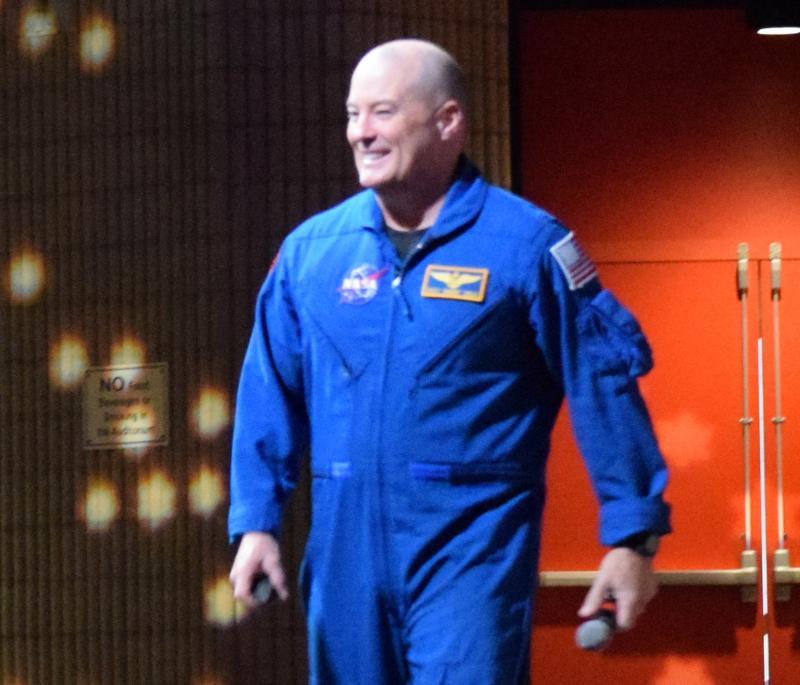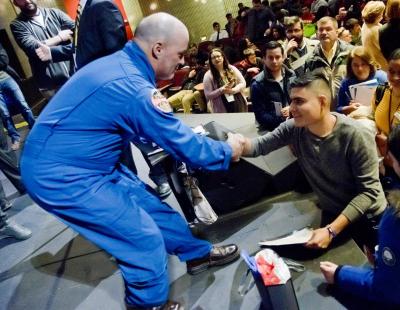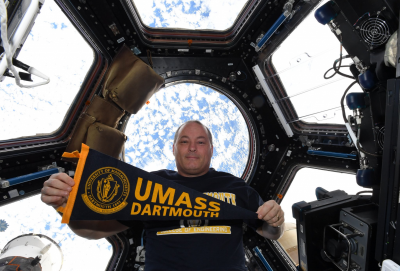UMass Dartmouth grad shares his out of this world career as an astronaut
Few people will have more to talk about over Thanksgiving dinner than Scott Tingle. He’s been to space, worked on out-of-this-world research projects, and fulfilled his lifelong dream – all in the past year.
Tingle returned to his alma mater, UMass Dartmouth, on November 15 to share his 168-day experience aboard the International Space Station, life as a NASA astronaut, and how he achieved his dreams to an audience of UMass Dartmouth faculty, students, and New Bedford and Fall River students.
Tingle solidified his dream of becoming an astronaut early on in his life, but knew it was a long shot. He graduated from UMass Dartmouth with a degree in mechanical engineering in 1987. Tingle credited his time at UMass Dartmouth with a solid understanding of the fundamentals he needed to realize his dream.
“For me, it all started here,” Tingle said.
He went on to earn a master's degree at Purdue University. He joined the U.S. Navy as a commissioned officer in 1991, and served as a test pilot.
“I did it with the knowledge that there’s a really small chance of me actually getting to be an astronaut,” Tingle said. “Anything I did, I knew I was going to have to enjoy doing the rest of my life.”
In 2009, he was accepted into that year’s class of NASA astronauts. Following training and waiting, his moment to shine arrived when he was tapped to travel to the International Space Station. He bid Earth farewell on December 17, 2017, launching from Baikonur Cosmodrome aboard a Soyuz spacecraft. He returned to Earth on June 3, 2018.
Life aboard the International Space Station is demanding and busy. When one student asked what Tingle does in his downtime, his gut reaction was “what downtime?” An average day is about 14 hours long, with sleep consuming the rest of the day.
“Any time you had that you might’ve been bored, you’re probably asleep,” Tingle said.
That’s not to say Tingle and his astronaut comrades did not have some fun once in a while. An avid guitarist, Tingle and several other musicians occasionally performed live music, broadcast throughout the station via bluetooth speakers. Movies are another option, although without gravity, it can be tough to share food and drinks.
Tingle participated in a space walk during his time aboard the space station. It was one of the toughest things he’s ever had to do in his life, as he was confined to an advanced suit which was difficult to maneuver and get into.
“It’s very physically demanding,” Tingle said. “We have to keep ourselves in shape and keep our brains right because it’s thinking two to three steps ahead. That is about the hardest thing I’ve ever done, and it’s also the most rewarding.”
Aboard the space station, there’s labs everywhere. Between 200 and 250 experiments are happening at any given time, and he helped out with numerous experiments during his time in space. The experiments Tingle worked on could have broad implications for life on Earth.
“You can go from maintenance to doing a space walk to working with [a] metabolic tracking [experiment],” Tingle said.
He said the biggest experiment surprises were with polymers. On Earth, they are combined with gravity to form plastics, vinyls, and other products used daily. But in space, without gravity, they form new, stronger, and more durable structures.
“It’s amazing, and Procter and Gamble estimates we’re going to have an impact with that little experiment for the billions of people on this planet,” Tingle said.
He urged the students in the audience they too can be a part of that future, regardless of their area of study.
“We need talent in all disciplines, not just engineering, not just math, not just science,” Tingle said, listing off roles from graphic design to public affairs as other avenues to entering the world of NASA.
















